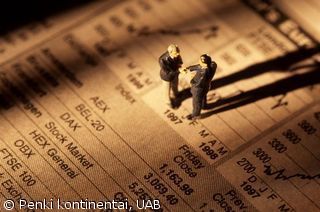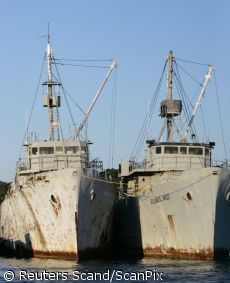Infrastructure is lacking despite economic growth in largest of nations about to join European Union
Published:
29 March 2004 y., Monday
Just weeks before Poland joins the European Union on May 1, Warsaw struts a new prosperity. But all is not what it seems: Despite strong economic growth driven by exports, the country faces high unemployment, political uncertainty and deeply rooted corruption.
Paradoxes abound. Those who can afford new Volvos or BMWs must still drive them along potholed roads. The hip cafes that draw fashionable young people are often housed in drab Stalinist-era concrete block buildings.
And many of the luxury goods for sale in the bright new shops and malls remain off-limits to many in Poland, where only 1 percent earn above $18,000 a year.
Such contrasts exist in all eight former communist states due to join the EU, but the stakes are highest in Poland, the largest of the new countries.
With more than 38 million people, Poland accounts for 52 percent of the new EU citizens. Poles will be 8.4 percent of the union’s population, so its economy performance will have a major impact on the rest of the bloc, the world’s largest economic union.
Analysts say that Poland’s greatest economic strength is the many modern, efficient companies that have made the transition and are already selling successfully to EU countries.
Ten years ago, Polish exports consisted mostly of raw products like coal, sulfur, apples and meat. Today, exports also include higher-value goods like precision surgical instruments, pharmaceuticals and car engines.
Šaltinis:
detnews.com
Copying, publishing, announcing any information from the News.lt portal without written permission of News.lt editorial office is prohibited.
The most popular articles
 The finance chiefs from the leading economies met in southern England to discuss measures to deal with the global economic crisis.
more »
The finance chiefs from the leading economies met in southern England to discuss measures to deal with the global economic crisis.
more »
 Environmental projects up for bid at ‘auction floor’ conference in Brussels.
more »
Environmental projects up for bid at ‘auction floor’ conference in Brussels.
more »
 In the United States increasing numbers of men are having vasectomies to avoid any added strain on hard-pressed finances.
more »
In the United States increasing numbers of men are having vasectomies to avoid any added strain on hard-pressed finances.
more »
 Within last year the number of settlement operations made by using AB Bank SNORAS payment cards grew by 21 per cent or twice more than on the market where 10 per cent growth was fixed.
more »
Within last year the number of settlement operations made by using AB Bank SNORAS payment cards grew by 21 per cent or twice more than on the market where 10 per cent growth was fixed.
more »
 The “Erika III” package, aimed at protecting Europe's coasts from maritime disasters and improving passenger and crew safety, was adopted by Parliament on Wednesday.
more »
The “Erika III” package, aimed at protecting Europe's coasts from maritime disasters and improving passenger and crew safety, was adopted by Parliament on Wednesday.
more »
 Improving the transparency and the supervision of the financial system to ensure proper risk management in the banking sector is the aim of legislation approved on Monday by the Economic and Monetary Affairs Committee.
more »
Improving the transparency and the supervision of the financial system to ensure proper risk management in the banking sector is the aim of legislation approved on Monday by the Economic and Monetary Affairs Committee.
more »
 MEPs could back speeding up the rate at which Europe's regional funds are made available.
more »
MEPs could back speeding up the rate at which Europe's regional funds are made available.
more »
 The Commission has taken a humanitarian decision for €700,000 to provide assistance to communities affected by floods in Fiji, the Solomon Islands and Papua New Guinea.
more »
The Commission has taken a humanitarian decision for €700,000 to provide assistance to communities affected by floods in Fiji, the Solomon Islands and Papua New Guinea.
more »
 The international business magazine Euromoney has announced the results of its Private Banking Survey 2009, and Parex banka has received the award for “Best Private Banking Services Overall” in Latvia.
more »
The international business magazine Euromoney has announced the results of its Private Banking Survey 2009, and Parex banka has received the award for “Best Private Banking Services Overall” in Latvia.
more »
 Mass layoffs and inflation are pushing people to seek food aid.
more »
Mass layoffs and inflation are pushing people to seek food aid.
more »